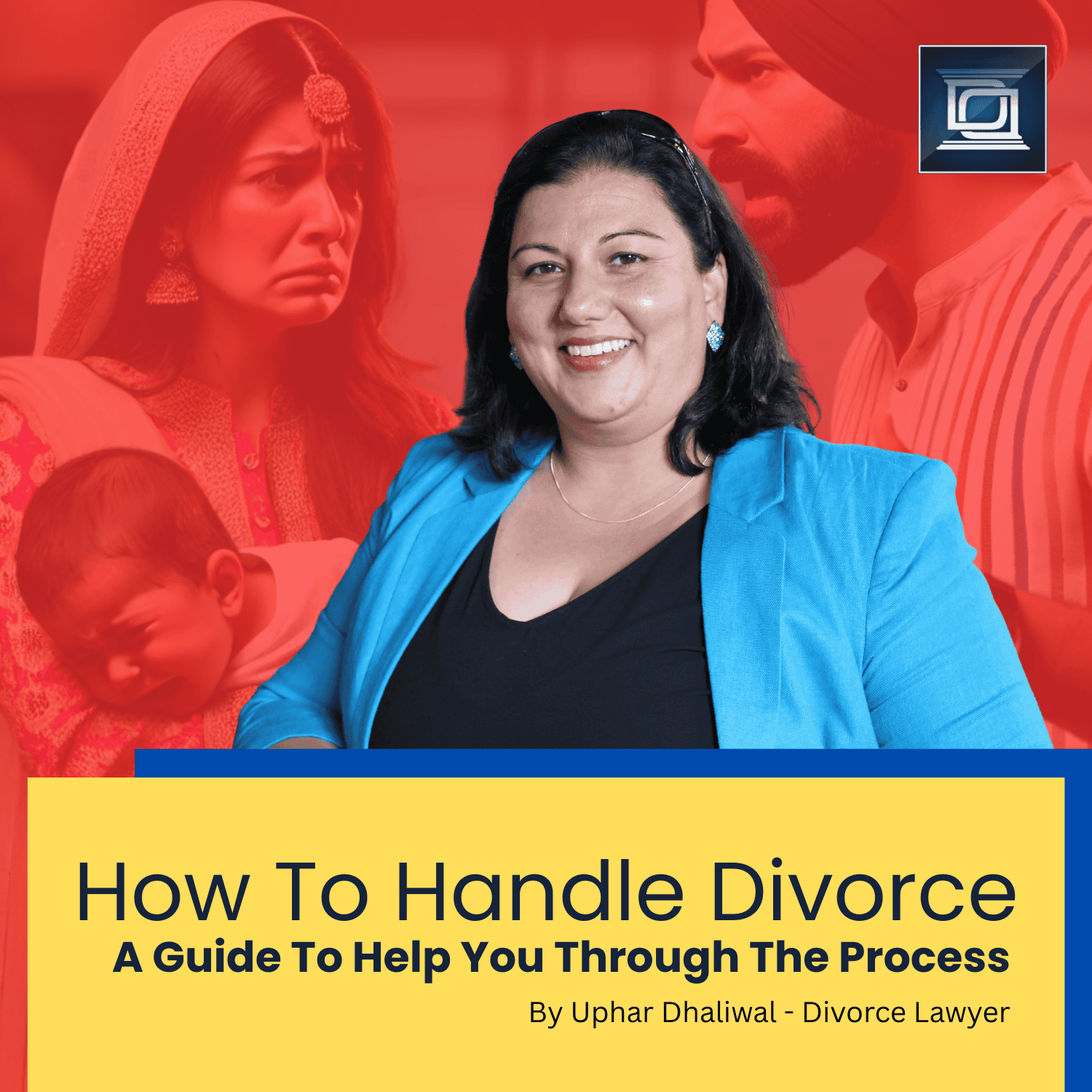Divorce is a challenging life transition filled with emotional, legal, and financial complexities. Uphar K. Dhaliwal, a top family law lawyer in British Columbia and co-founder of the Dhanu Dhaliwal Law Group, with family lawyer offices in Abbotsford and Surrey. She brings years of experience to guide you through this process under Canadian law. Whether you’re starting the divorce journey or in the midst of it, this comprehensive guide, tailored for British Columbia, will help you make informed decisions every step of the way.
⚠️ Note: The Ultimate Guide to Divorce in Canada is meant to be informative, not legal advice. Your specific situation may require tailored legal counsel. Please consult a lawyer in your community.
Understanding Divorce in Canada
✅ 1. What Are the Grounds for Divorce?
Under Canada’s Divorce Act, there are three legally recognized grounds for divorce:
- Separation: Spouses must live apart for at least one year.
- Adultery: Proof of an extramarital affair by one spouse.
- Cruelty: Physical or mental abuse that makes the marriage intolerable.
Canada primarily operates under a no-fault divorce system, meaning you don’t need to prove wrongdoing. A one-year separation is enough in most cases.
➡️ For a deeper dive into whether couples regret divorce, visit Do Couples Regret Divorce?
✅ 2. Residency Requirements for Divorce
To file for divorce:
- One spouse must have resided in the province where the divorce is filed for at least one year.
- In British Columbia, at least one spouse must meet this requirement for jurisdiction.
Key Legal Considerations in British Columbia
⚖️ 1. Division of Property
In BC, property division is governed by the Family Law Act (FLA):
- Property acquired during the marriage is generally divided equally, unless stated otherwise in an agreement.
- Pre-marital property remains with the original owner, but any increase in value during the marriage may be shared.
- Debts incurred during the marriage are typically shared equally.
➡️ For detailed insights, check out Dividing Shared Property.
⚖️ 2. Spousal Support
Spousal support depends on several factors:
- Duration of the marriage
- Financial contributions and needs
- Career impact due to marriage
Spousal support can be awarded on a compensatory or needs basis and is determined using flexible court guidelines.
⚖️ 3. Child Custody & Parenting Arrangements
The focus in British Columbia is always the best interests of the child:
- Parental responsibilities include decision-making on education, healthcare, and extracurricular activities.
- Parenting time determines how much time a child spends with each parent.
- Domestic violence is a key factor in parenting decisions.
Navigating the Divorce Process
1. Filing for Divorce
- Divorce proceedings begin by filing a Notice of Family Claim at the Supreme Court of British Columbia.
- Ensure you meet residency requirements before filing.
2. Serving Divorce Papers
- The other spouse must be formally served.
- ✅ This must be done in person by a third party (not you), age 19+, or via a professional process server.
- An affidavit of service is required to finalize the divorce.
3. Responding to Divorce Papers
The served spouse can:
- ✅ Agree to the claim
- ❌ Contest the claim
- File a counterclaim
➡️ For dispute-handling strategies, read Contested Divorce.
4. Dispute Resolution Options
- Mediation: A neutral third party facilitates discussions.
- Collaborative Divorce: Both parties agree to resolve matters outside of court.
- ⚠️ Independent Legal Advice (ILA): It’s wise to review agreements before signing.
- ⚖️ Court Litigation: If no agreement is reached, the court makes final decisions.
➡️ Learn more in How Mediation Works in Divorce Cases.
Special Divorce Circumstances in British Columbia
1. Indigenous Families
- The Family Law Act acknowledges Indigenous laws and traditions.
- Courts may integrate Indigenous dispute resolution practices.
⚠️ 2. High-Conflict or Domestic Violence Cases
- ⚖️ Parenting coordinators may be appointed.
- Supervised parenting time may be required.
- ⛔ Protection Orders may be issued.
3. Common-Law Relationships
In BC, common-law couples have similar rights as married couples if:
- They have lived together for at least two years.
- They have a child together.
❌ Avoid These Common Divorce Mistakes
Avoiding errors in the divorce process ensures a smoother experience. Read about Mistakes to Avoid in a Divorce.
FAQs About Divorce in Canada
❓ Can My Spouse Take Everything in a Divorce?
- ❌ No. BC laws ensure a fair division of assets. Learn more: Can My Husband Take Everything in a Divorce?
⏳ How Long Does a Divorce Take?
- A one-year separation period is required unless based on adultery or cruelty.
- If children are involved, parenting time and child support must be settled first.
⚖️ Do I Need a Family Lawyer?
- ✅ Yes. A lawyer protects your interests. See Top Reasons to Hire a Family Lawyer.
Why Choose Uphar K. Dhaliwal and Dhanu Dhaliwal Law Group?
✅ Expertise: Handling complex divorce cases across BC.
✅ Compassion: A client-centered approach that reduces stress.
✅ Tailored Solutions: Knowledge of Canadian & BC-specific laws for the best outcomes.
Take the First Step Toward a Better Future
If you’re considering divorce, don’t navigate this journey alone. Uphar K. Dhaliwal and the Dhanu Dhaliwal Law Group provide legal expertise & emotional support every step of the way.
➡ Schedule Your Consultation Today to explore your options and make informed decisions for your future.
Reviewed & edited by Uphar Dhaliwal, co-founder of Dhanu Dhaliwal Law Group. A real lawyer stands behind this guide.






